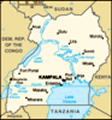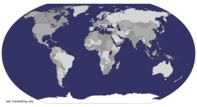Advertisement
Published: June 26th 2017
Sorry we haven’t been around much; our group was placed in Ruhija, and although it has an overwhelming amount of beauty, it lacks the internet and electricity necessary to make blog posts.
Our compulsory transition to the simple life was a blessing in disguise. We have been given ample time to reflect and truly immerse ourselves in this lovely community. Instead of telling you a never-ending story about our four weeks at our community placement we thought it would be better to give you an overview of the life lessons we acquired in Ruhija.
Life Lesson #1: The beautiful view does come at a cost.
Upon arriving in Ruhija, we were blown away by the lush rolling hills that the community was nestled in. Although it is quiet, green and connected with nature, it is also disconnected from a reliable water source, easy access to hospitals and food.
These barriers are blatantly apparent the moment you walk into the health clinic, but are very difficult to address. Food, water and appropriate medical care are basic human rights and could solve a large portion of the patients’ ailments we addressed at the clinics,
but that does not change their ability to access it. There were moments during our placement that we felt hopeless; often it was when we cared for pediatric malnutrition patients. We helped in the little ways that we could and tried to accept the things we could not change.
Life Lesson #2: People will judge you by the colour of your skin. Do not fall into this trap and do
the same.
If we had a thousand shillings for every time we have been called Mzungus, we would be mulitishillingaires. I do not think any of us have been this aware of the colour of our skin and how white skin is perceived to be equivalent to money and privilege. Our Mzungu status automatically labelled us as tourists, which made it difficult to establish authentic relationships with community members. We were frequently charged double, had to pay money to visit schools and neighbouring communities, and on more than one occasion we were chased by children screaming for us to give them money while on our runs.
While this treatment was not pleasant and was hard to stomach, it opened our eyes to a
few things. First, white tourists have conditioned a lot of rural Ugandan people to associate white skin with money and free candy. Second, being judged by an external factor outside of your control is dehumanizing. The realizations were difficult for us to accept, and we were extremely bitter during our first weeks, but we learned to work around it. We opted to give our time--not our money and possessions-- to community members and children. We started basket weaving, made paper beads with the young girls and boys, and harvested honey with reformed poachers. Eventually, our persistence paid off: we made friends who saw who we were as people before labelling us as typical Mzungus. The friendly waves on the way to the health centre, compliments about our “smart” attire and basic Rukiga conversations made Ruhija feel like a home.
This experience did give us some insight into what it is like to be an outsider, something we have never experienced as Caucasians in Canada. Although this wasn’t easy, we hope that our time in Ruhija will enable us to empathize with patients and individuals that belong to minority groups in Canada.
Life Lesson #3: A
single person can make a huge impact.
One of our strongest connections we made in Ruhija was with an inspiring young woman named Tina. She is the owner of Tina’s, the ITFC watering hole and our favourite restaurant in Ruhija. She is also the founder of the project
Change a Life Bwindi. Her project works to empower the people of Ruhija by teaching them profitable and sustainable skills that benefit both the community and the environment. Some of her initiatives include bee keeping and honey production programs for reformed poachers, and basket weaving for local women--many of which have goals of saving to buy their own water tanks, solar panels and to pay their children’s school fees. She also teaches young girls and boys how to make paper bead jewelry on the weekends to fund her pads project, which helps to ensure girls do not miss or drop out of primary school when they begin their menstruation.
Tina graciously took us under her wing and invited us to participate in her project, and it was the highlight of our community placement. She set us up with local women who showed us how to weave our own
baskets and to dance like a true Rukiga woman (the secret is to literally shake the ground when you dance). We suited up and visited the bees, sampling the fresh-from-the-hive honey, and we spent our Sundays with the kids making beads and learning local songs.
The more time we spent with Tina, the more we became enamored by how large her impact was in this community. She is only one Ugandan woman, but she had a mission and a vision and decided to address the current situation in Ruhija despite the challenges. Tina is proof that one person--one woman-- can make a difference, and we can all safely say that we want to be Tina when we grow up. You can check out her project at
www.changealifebwindi.org or on FaceBook.
Life Lesson #4: You grow in discomfort; not every learning experience comes from a positive
situation.
Our placement has been similar to the boiling frog effect. The beginning was easy: we had a cook, the market on Tuesday had a variety of food, but as time went on, we were slowly faced with new challenges. We did not realize how far
we ventured outside of our previous Canadian comfort zones until we returned to the city of Mbarara.
It started with us walking 2.5Km everyday each way to the health clinic on a very dusty road. After our first week, we could no longer afford to pay our cook, so we began cooking all our meals on a coal stove. As time went on, food at the market had less and less variety and the prices increased because we were entering dry season. Soon we were eating overpriced posho and cabbage for every meal. With the dry season beginning, our rain collection tank dried up, so we hauled water in 10L jerry cans up and down a large hill daily. Drinking water soon trumped bucket showers, so the red dust that covered the streets ultimately covered our bodies as well. We welcomed visitors in the form of large rats in our food and mysterious bugs in our beds.
Writing out all the challenges we faced in Ruhija makes it seem like we were living in hell, but in reality we were living quite comfortably. We were surprised by how we thrived in an environment that we would
have thought to kill us back home. Each of us grew exponentially in ways we never expected, and we found joy in the little things such as running water, power and toilets that we previously took for granted in Canada.
Life Lesson #5: Tourism is a double-edged sword.
Ruhija’s ideal location bordering the Bwindi National Park has attracted many tourists to its community for an opportunity to see the Silver Back Gorillas. This recent change of events has created both positive and negative effects for both the national park and the animals that live within.
The tourism increases awareness and protection for the animals and trees, preventing deforestation and poaching of animals. The national park generates enough funds and support from local and global communities to preserve its beauty and uniqueness. However, the tourism comes at a cost for the gorillas.
Gorilla tracking provides people the opportunity to see gorillas in their natural environment, allowing them to enter the gorillas’ homes and walk alongside them. The tours run twice a day, with up to eight people per group. The high volume and frequency of traffic has slowly habituated the gorillas to become
tolerant of people. The habituation process causes the gorillas to lose some of their natural survival instincts as they become too docile around other animals and gorilla groups. On top of that, the introduction of humans has brought about respiratory issues and other infections for the gorillas. The gorillas are in a vulnerable position, having no ability to hide, run from, or escape the pressures and stresses humans place on them.
While tourism has its effects on the animals, it also has profound effects on the people of Ruhija. The community has learned that majority of Mzungus who come to Ruhija come for one purpose, to see the gorillas. Since tracking gorillas is an expensive adventure, plus the additional cost of staying in the tourist lodges, these foreigners are seen only as people with money, status and privilege. Like previously mentioned in lesson two, a barrier is built between people, preventing the formation of any genuine relationships.
On the plus side, tourism creates jobs, opportunity, and business for the families of Ruhija, where without it they would have very little. Tourism can create a sustainable business, a secure income, and comfortable living, but at what price? Although we
could see the benefits, we also questioned whether it was ethical to commodify and consume wildlife. It is the backbone of this community, but it may also be its demise if the forest is not respected.
So, there it is-- all of our experiences from the past month compacted into an unofficial Ruhija Handbook. We can all safely agree that our time in Ruhija has been the most rewarding experience of our lives and we can’t wait to see what else Uganda has instore for us.
Advertisement
Tot: 0.113s; Tpl: 0.012s; cc: 5; qc: 43; dbt: 0.05s; 1; m:domysql w:travelblog (10.17.0.13); sld: 1;
; mem: 1.2mb











